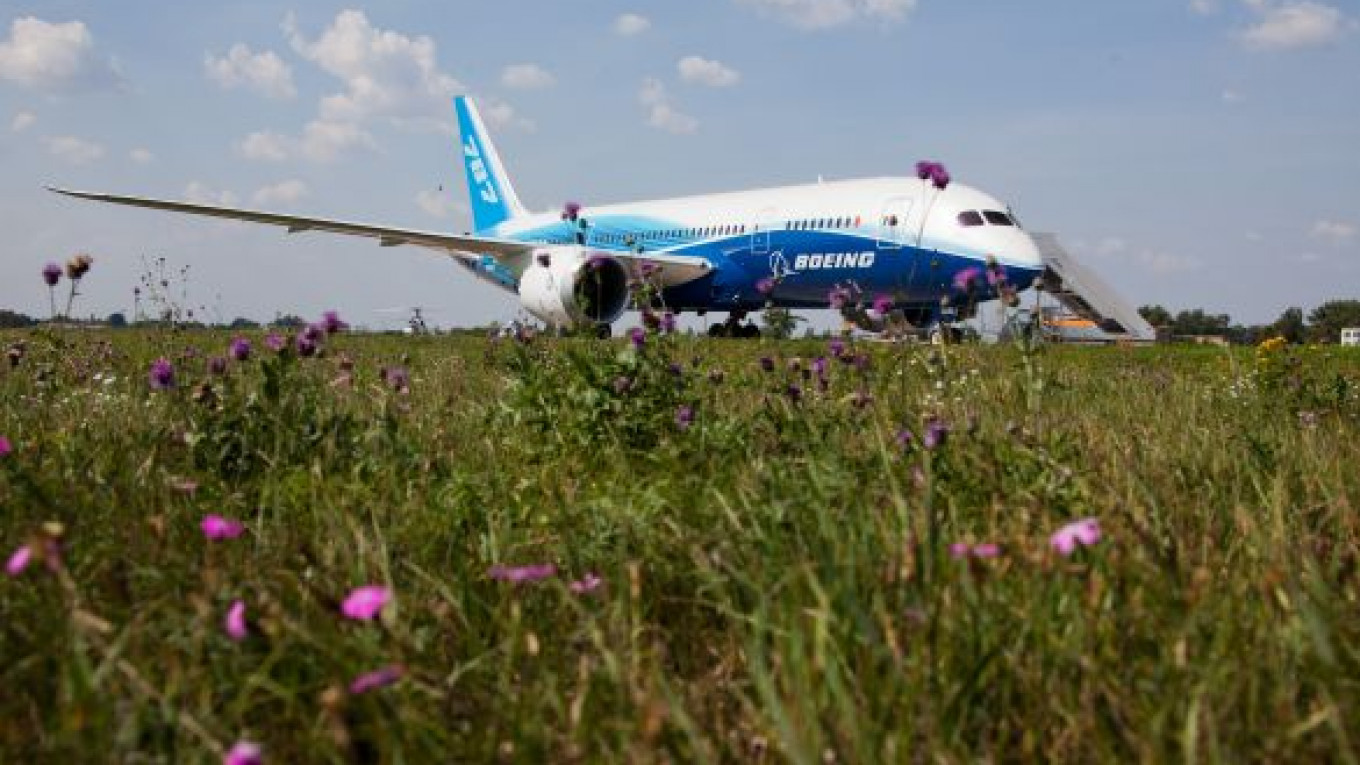VSMPO-Avisma, the largest titanium company, will spend $800 million by 2015 to increase output and make semi-finished products for airplanes as clients including Boeing seek components that are ready to install.
"Aircraft producers don't want to do the details for aircraft anymore," Mikhail Voevodin, chief executive of VSMPO-Avisma, said in an interview in Moscow last week. "They want to be focused on research and development, assembly, and have the chassis made in full by the suppliers."
Titanium companies are investing in capacity to make more sophisticated products, as rising demand from plane manufacturers counters a sluggish market for slabs and ingots. VSMPO-Avisma stopped selling ingots this year to focus on semi-processed materials, using the scrap generated to feed its refineries. Competitors Titanium Metals and Allegheny Technologies already refine most of their ingots.
Over the next 20 years, Boeing expects the aircraft industry to deliver 33,500 new planes, valued at more than $4 trillion, according to its web site. In 2009, the Chicago-based company began a venture with VSMPO-Avisma to produce parts in Russia for the 787 Dreamliner, the first composite-plastic airliner. VSMPO-Avisma is now seeking to set up other similar ventures with international companies at its base in the Sverdlovsk region.
Boeing, Airbus
"We are in talks with Boeing and Airbus, as well as with their suppliers," Voevodin said, without naming potential partners. VSMPO-Avisma would hold 50 percent of any joint venture, he said.
Such a venture would benefit from tax breaks in Titanium Valley, a special economic zone in Sverdlovsk. The zone, one of several established by the Russian government to attract foreign manufacturers, was announced in 2010.
As part of the $800 million investment plan, VSMPO-Avisma will boost output of forgings, corrosion-resistant products used in airplane wings, more than threefold to about 8,000 tons in 2015 from 2,200 tons this year, Voevodin said. Separately, VSMPO-Avisma and Boeing will together invest $10 million in equipment to expand their Ural Boeing Manufacturing venture.
"The business model for the 787 aircraft is that we buy parts that have been processed to the highest degree," said Dmitry Krol, a spokesman for Boeing in Moscow.
Forgings fetch about $80 to $200 a kilogram, compared with about $17 to $30 a kilogram for titanium ingots, Voevodin said. Prices will probably be flat this year and next, he said. VSMPO fixes prices for about 70 percent of its production in long-term contracts; about 15 to 18 percent of output goes to Boeing.
Production Outlook
VSMPO-Avisma expects to produce 27,000 metric tons of titanium this year, returning to 2007 levels, Voevodin said. Titanium for non-aircraft use, trading for $27 a kilogram, will not climb back to pre-crisis prices of $45 a kilogram because China is expanding output, he said.
VSMPO-Avisma agreed to supply titanium products for Airbus SAS's A350 aircraft through 2020, the Russian company said Aug. 16. It is aiming to become the sole supplier of A350 chassis parts for European Aeronautic Defense & Space, or EADS, maker of Airbus airplanes, Voevodin told reporters at the MAKS air show after the companies signed the accord.
Demand from the aerospace industry will rise in 2013 or 2014, or sooner if Boeing starts to sell its 787 aircraft after tests this quarter, he said in the interview. Aircraft manufacturers are still using up stockpiles of titanium from before the crisis, Voevodin said.
Stock Sale
VSMPO-Avisma may issue new stock to raise $300 million to $600 million to build an ilmenite mine in the Tambov region, and the board will discuss the plan in September, Voevodin said. The company currently buys the mineral, an oxide of iron and titanium, in Ukraine, India and Mozambique, and is in talks to source supplies from Vietnam and Sri Lanka, he said.
VSMPO-Avisma has also purchased ilmenite from London-based producer Petropavlovsk, which extracts the mineral in Russia's Amur region.
The titanium giant's shares have risen 41 percent to 4,160 rubles ($138) in Moscow in the past 12 months, valuing the company at about $1.7 billion.
The producer may also sell stock for the first time abroad, Voevodin said. VSMPO-Avisma may hold an offering overseas in 2014, RIA-Novosti reported last week, citing Sergei Chemezov, head of Russian Technologies, the state-run holding company that controls VSMPO-Avisma.
It "makes sense" to start the international offering only when the investment program is nearing completion, Voevodin said.
A Message from The Moscow Times:
Dear readers,
We are facing unprecedented challenges. Russia's Prosecutor General's Office has designated The Moscow Times as an "undesirable" organization, criminalizing our work and putting our staff at risk of prosecution. This follows our earlier unjust labeling as a "foreign agent."
These actions are direct attempts to silence independent journalism in Russia. The authorities claim our work "discredits the decisions of the Russian leadership." We see things differently: we strive to provide accurate, unbiased reporting on Russia.
We, the journalists of The Moscow Times, refuse to be silenced. But to continue our work, we need your help.
Your support, no matter how small, makes a world of difference. If you can, please support us monthly starting from just $2. It's quick to set up, and every contribution makes a significant impact.
By supporting The Moscow Times, you're defending open, independent journalism in the face of repression. Thank you for standing with us.
Remind me later.






